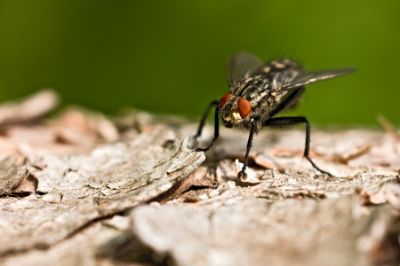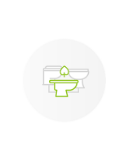
Composting toilets are designed to keep flies away, and with proper maintenance flies shouldn't be a problem. If, however, you've found flies buzzing around your toilet, you need to deal with them sooner rather than later. Flies breed quickly and if left alone, can develop into a big problem.
Fruit flies are the main culprit when it comes to composting toilet fly strike. Fruit flies are attracted to acidic conditions, heat, and humidity.
If you put vegetable peelings in your composting toilet, blue bottle flies can also become a problem. Blue bottles are attracted to rotting flesh, and this is exactly why we don't recommend adding foreign objects, such as vegetable peelings, to your compost.
Fly strike can originate from other areas of your property and migrate to your composting toilet. The veggie compost bin is usually the main culprit of onsite insects, but things like sweating garbage bins, animal leavings, and decaying fruit matter from garden activities can also attract insects. In order to troubleshoot and prevent fly strike, it is important to treat all areas of the house/property where flies may be breeding and feasting.
Here, is how to combat fly strike:
Check Your Fan and Ventilation
Fans in composting toilets are vital for keeping flies away - they create constant airflow through the system, making it difficult for flies to settle. Make sure your fan is operating at maximum capacity. Make sure it is clean and clear of dust.
The ventilation pipe should also be clear of blockages. Try to reduce horizontal sections where condensation can pool, and make sure there are no dips or loops in the flexi hose (trim it to length if required). Check, also, that the vent cowl is secured to the vent pipe, and that the mesh in the ventilation system is clean, as this too can block with dust. Keep in mind that fruit flies are small enough to penetrate standard fly screens, so try to use midge mesh in the house instead.
Check Your Drainage
Again, fruit flies are attracted to humidity and the acidic nature of leachate. Check your compost - if there is a lot of liquid inside and the compost is soggy, there may be a drainage issue. To clear drainage blockages, disconnect the drain pipe and use a hose to blast water down the inside of the pipe.
Going forward, run your system dryer than you did previously by adding higher amounts of bulking agent into the chamber.
Kill the Flies
Obviously, you'll need to kill existing flies. To do this, turn off your fan, and spray the system (including the inside of the chamber) with conventional fly spray. Compost is not significantly sensitive to general insecticides, however, it is still best to use natural insecticides such as DEEM Triple Defence Plant Spray 500ml.
Kill the Breeding Cycle
To deal with the problem at its root, you'll need to kill the flies' breeding cycle. Cover the surface of your compost with an even layer of DEBug Diatomaceous Earth 1000g (use 1/2kg per person, up to 2 kgs) - this will kill breeding in the compost. Then, put an even cover of your chosen bulking agent over the top of this.
Re-balance the pH of Your Compost
Remember, fruit flies are attracted to acidic conditions, so it is a good idea to re-balance the pH of your compost to dissuade flies. To do so, simply add water to your compost pile. For best result, make alkaline water and use that (1 x tea spoon of baking soda per 1L of water). Add about 1/2L per person, relative to the size of your system.
Hydrate Dry Compost
Fly strike can also be caused by extreme dryness of compost. This is unusual in NZ climates, but if it happens, you will need to re-hydrate the pile. Make a strong enzyme solution and add this to the compost. Use a 1:10 ratio to mix Nature Flush | Enzymes - Concentrate 1 Litre (Enzymatic) with water, and add 1/2L per person, relative to the size of the system and the degree of compost dryness.
Clean the Toilet and Surrounding Areas
Finally, clean the toilet and any surrounding areas where flies may be breeding. Remember, it is best to avoid getting flies to begin with, and remove any conditions that may be attracting them. Always make sure to clean up spills, remove overripe fruit from your house, dispose of sweating garbage, animal leavings, and decaying fruit matter from garden activities.
Need help choosing a system? Call WCTNZ® on 0800 022 027 for free advice on system specification and setup. Advanced design consultancy services are also available.
WCTNZ® | Waterless Composting Toilets NZ Limited | Copyright 2022 ©





















